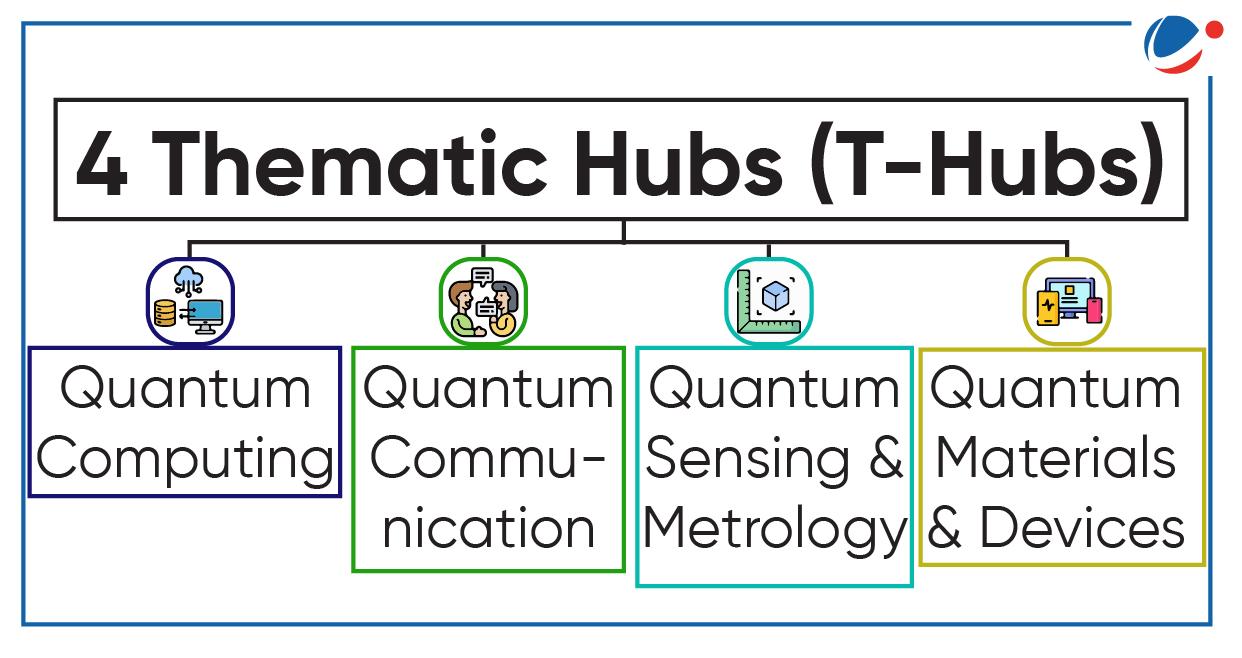Why in the News?
The 1st meeting of Mission Governing Board (MGB) of National Quantum Mission (NQM) discussed implementation strategy and timelines of NQM as well as the formation of Mission Coordination Cell (MCC).
About Mission Coordination Cell (MCC)
- The MCC will be set up as a coordinating agency for the NQM and will work in coordination with the Mission Secretariat, Department of Science of Technology (DST).
- The MCC will be set up in an institution identified by DST, based on merit and existing infrastructure.
- It will function under the overall supervision and guidance of Mission Technology Research Council (MTRC).
- MTRC is responsible for providing guidance and oversight to the NQM, and for selecting the proposals that will be funded under the mission.
Quantum Technology
|
About National Quantum Mission (NQM)
- NQM is a flagship initiative launched by the Government of India for period of 2023-2031 with an aim to make India a global leader in quantum technologies.
- Aim: To seed, nurture and scale up scientific and industrial R&D and create a vibrant & innovative ecosystem in Quantum Technology (QT).
- Mission objectives: The mission focuses on achieving specific milestones within its eight-year timeframe:
- Quantum Communication Network: Establishing a secure and high-bandwidth communication infrastructure spanning 2,000 kilometres.
- Quantum Computing Power: Developing quantum computers with a processing capacity of 1,000 qubits, unlocking immense computational capabilities.
- Magnetometry and Atomic Clocks: Advancing the development of highly sensitive magnetometers for precision measurements and reliable atomic clocks.
- Quantum Materials Design: Synthesizing and characterizing novel quantum materials with tailored properties for cutting-edge device fabrication.
- Mission also plans to establish four thematic hubs (T-Hubs).

Significance of the Mission
- Global Leadership: Positions India as a major player in the burgeoning quantum technology landscape.
- R&D Boost: Accelerates research and development in quantum computing, communication, sensing, and materials.
- Secure Communication: Develops quantum networks for unbreakable, high-bandwidth communication.
- Powerful Computing: Creates 1,000-qubit quantum computers to tackle complex problems beyond classical reach.
- Precision Measurement: Advances magnetometers and atomic clocks for groundbreaking scientific applications.
- Innovation Ecosystem: Establishes thematic hubs fostering collaboration and expertise across diverse sectors.
Challenges in NQM
- Poor Expenditure on Research: While government provides fund for NQM but spending on R&D in India remained about 0.64 % of GDP which is very low. Most of the developed countries spent more than 2% of their GDP on R&D.
- Lack of Private Investment: India's private sector lags behind advanced nations in R&D investment, contributing less than 40% compared to over 70% in developed countries. This funding gap hinders access to crucial resources and slows down progress in the National Quantum Mission.
- Lack of Skilled Workforce: NQM requires a critical mass of trained professionals across various disciplines, including quantum physics, computer science, and engineering. However, India currently faces a significant skill gap due to inadequate training programs and Industry-academia disconnect.
- Availability of Infrastructure: Building and maintaining sophisticated labs, specialized equipment, and high-performance computing facilities require significant resources and continuous upgradation.
- Intellectual Property Rights: Establishing clear ownership and licensing frameworks for quantum-related intellectual property remains a work in progress, creating uncertainty for commercialization and innovation.
- Regulatory Landscape: Adapting existing regulations and developing new frameworks to govern quantum technologies, considering ethical and security implications, requires careful consideration and timely action.
- Cybersecurity Threats: Ensuring the development and adoption of quantum-resistant cryptography is crucial to mitigate potential threats to existing encryption methods.
Way Forward
- Attract private investment: Implement tax breaks, grants, and public-private partnerships to incentivize private companies to invest in quantum research and development.
- Create specialized training programs: Partner with universities, research institutions, and industry to design and implement curriculum focused on quantum science, engineering, and technology.
- Promote regional infrastructure development: Allocate resources to develop quantum research infrastructure in various regions across India, fostering broader participation and talent distribution.
- Develop clear IP guidelines: Establish transparent and efficient frameworks for ownership, licensing, and technology transfer of quantum-related intellectual property.
- Establish a dedicated regulatory body: Create a central regulatory body focused on quantum technologies, responsible for drafting and implementing relevant regulations.
- Facilitate technology transfer: Develop mechanisms to bridge the gap between academic research and commercialization, allowing private companies to access and utilize cutting-edge quantum technologies.
- Invest in quantum-resistant cryptography research: Fund research and development of quantum-resistant encryption algorithms to safeguard sensitive data against potential threats from quantum computers.





